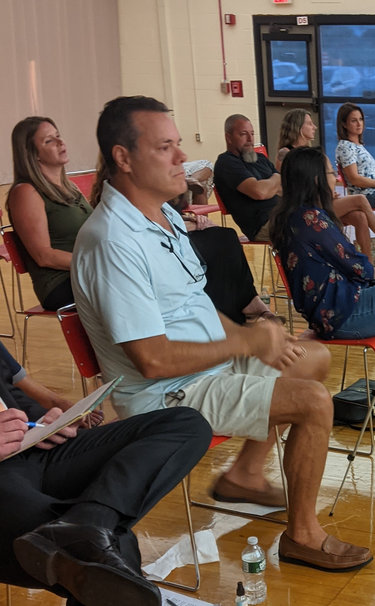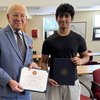Injunction filed in school mask-mandate lawsuit
ALBANY — The plaintiffs in a federal lawsuit brought against former state health Commissioner Howard Zucker have asked the judge in the case to temporarily repeal the state regulation requiring all students, faculty, and staff of all public and private schools in New York State to wear masks inside school buildings.
Zucker submitted his resignation on Sept. 23 and served until he was replaced by Mary Bassett on Sept. 29.
The lawsuit, filed on Sept. 20, was brought on behalf of five parents whose nine children had all allegedly suffered in one way or another from having to wear masks in school.
Plaintiff Jeff Thomas, a Knox resident whose two private-school-attending children are also named as plaintiffs, has been central to the suit. Thomas is the administrator of the 18,400-member Facebook group Unmask New York School Children Now, and has been giving the private group video updates on the case.
The plaintiffs claimed in their Sept. 27 filing that students had “suffered a constitutional injury, which constitutes an irreparable [injury],” and requested that the court issue a temporary restraining order prohibiting the state from implementing the mask mandate until the case can be made for a preliminary injunction.
A temporary restraining order issued by a federal judge can stay in place for only 14 days, and can be extended once. A preliminary injunction is a temporary restraining order that stays in effect for the duration of the case, unless the court decides otherwise.
The state was given until Oct. 1 to respond to the Sept. 27 motion, after which the plaintiffs had until noon on Oct. 5, after being granted a 12-hour extension on their deadline, to answer the state.
The parties are scheduled to appear at the Foley Federal Courthouse in Albany on Oct. 7, at 10 a.m., when the state will have to make the case as to why Judge Lawrence Kahn should not grant the temporary restraining order until he can make a determination on the plaintiffs’ motion for the preliminary injunction.
Arguments and rebuttals
The plaintiffs, the state claimed in its Oct. 1 response, are seeking a judgement declaring that the mask mandate violates: students’ First Amendment rights of free speech and association; the Constitution’s Supremacy Clause, which has been interpreted as the Constitution and federal law taking precedence when it conflicts with state law; and a parent’s right “to make decisions concerning the care, custody, and control of their children.”
These claims “are without merit,” the state argued.
Explaining how government orders have withstood challenges to their constitutionality, the plaintiffs said the regulation needs to have been found to further “an important governmental interest” and that interest “is unrelated to the suppression of free speech.” The plaintiffs argued Zucker hadn’t proven the school-hours-only mask mandate “furthers an important or substantial governmental interest.”
Zucker had an interest in “limiting the spread of COVID,” the state said in its response, while leaving “ample methods of communication available” because the mandate applies to someone only when they are in a school. Additionally, the mask mandate regulates “conduct, not speech,” the state argued.
Cases involving the First Amendment generally deal with the rights of the speaker, the plaintiffs state in their Sept. 27 filing. But the First Amendment “not only guarantees the right to speak,” the plaintiffs argue, “it also guarantees the right to listen and receive information.”
The plaintiffs argue that First Amendment protections extend beyond actual speech and include what’s known as “expressive conduct,” like a facial expression. The protections apply, the plaintiffs say, “as long as the conduct is sufficiently imbued with elements of communication.”
A student’s right to listen and receive information is hindered by mask-wearing because “facial expressions made while speaking are inexorably linked to the content and meaning of speech and its message,” the plaintiffs claim.
If a teacher is wearing a mask, it will “interfere with, inhibit, alter, and distort” his or her ability “to properly communicate their message,” the plaintiffs argue, which in turn affects a student’s ability to “properly perceive the message of the speaker.”
The state countered the mandate is “consistent with First Amendment protections,” and pointed to a recent Florida case where a county’s mandate instructing businesses to require masks when social distancing wasn’t possible was challenged on First Amendment grounds and failed.
The federal judge in the Florida case said the county’s “interest in preventing the spread of COVID-19” passed the test courts use, known as intermediate scrutiny, to determine the constitutionality of an act.
The state argued that the mask mandate does not conflict with federal law, as the plaintiffs assert, and noted the federal government “has issued numerous mask mandates of its own.”
Addressing a parent’s decision-making right when it comes to the control of their children, the state, citing existing case law, argues that right “does not extend beyond the threshold of the school door.”
A parent has the “fundamental right” to choose to send their child to public school, the state said, but, once that decision has been made, a parent’s “fundamental right to control the education of their children is, at least, substantially diminished.”
The plaintiffs also claimed the mandate was unconstitutional in part because New York is no longer under a COVID-19 state of emergency, which lasted from March of last year until June 24, and that “one unelected bureaucrat, in the absence of a state of emergency and without the involvement of any democratic process, cannot impose by fiat a mandate that interferes with 3,000,000 students’ ability to communicate and receive communication, without precise medical proof.”
The state recently addressed Zucker’s ability to require masks in a separate but somewhat similar case from a school district on Long Island.
The state’s Department of Health did not exceed its authority, the state argued in the Nassau County motion, because the emergency rule that allowed the department to institute the mandate “comes well within the broad powers that the Legislature has conferred on DOH to fulfill its critical mission in protecting public health.”
The legislature may “declare its policy in general terms by statute,” and “endow administrative agencies with the power and flexibility to fill in details and interstices and to make subsidiary policy choices consistent with the enabling legislation,” the state argued.
The Department of Health implemented the mask-mandate emergency rule based on sections of the state’s Public Health Law that authorize the commissioner “to supervise the reporting and control of disease, and to provide treatment for communicable diseases like COVID-19,” the state said in the Nassau County motion.
The state in its Oct. 1 response also said the plaintiffs made no mention of any law, “federal or otherwise,” that would have stopped Zucker from issuing the in-school mask mandate. “Indeed,” the state observed, “a ban of such mandates is, in and of itself, a violation of federal law.”



